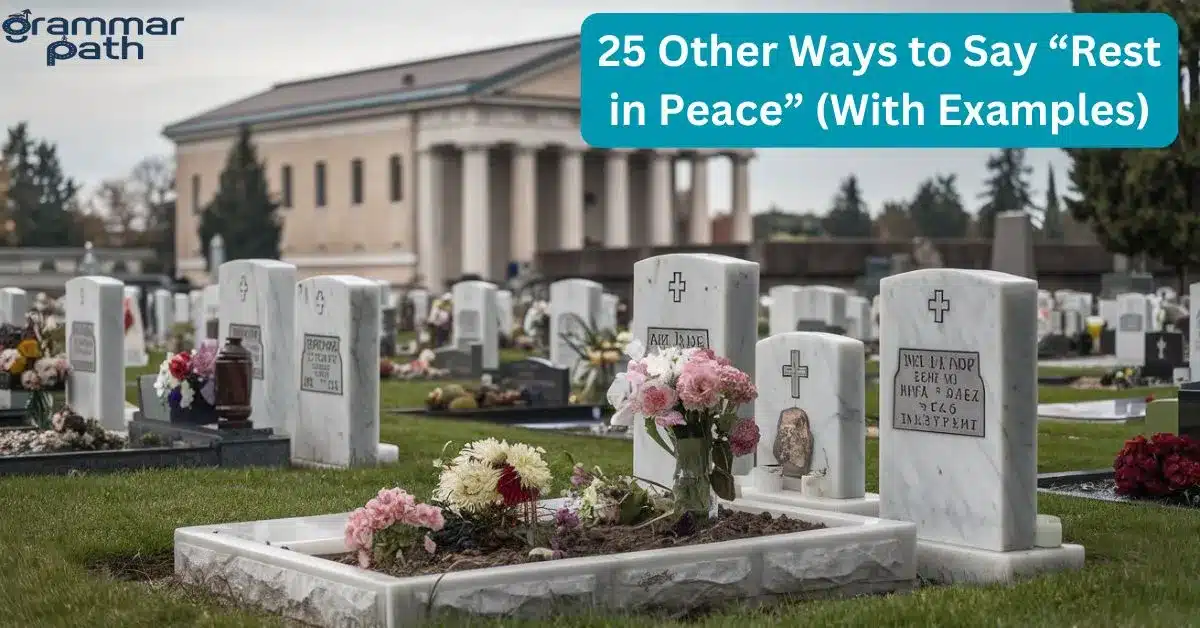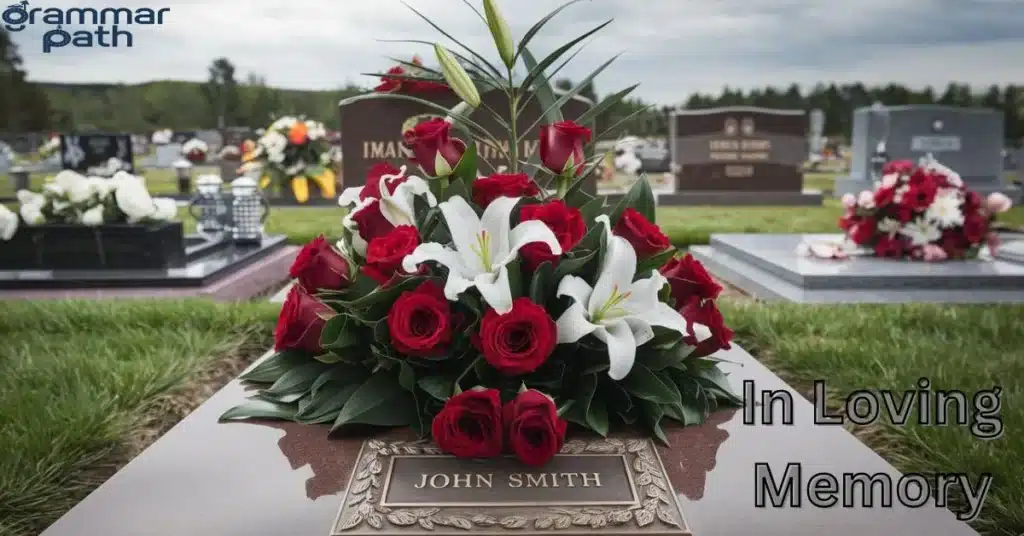
25 Other Ways to Say “Rest in Peace” (With Examples)
Losing a loved one is never easy, and finding the right words to express condolences can be equally challenging. While “rest in peace” has long been the standard phrase used to comfort those grieving, you may want to offer something more personal, heartfelt, or unique. Whether you’re writing an email to a friend, crafting a sympathy card, or posting a message on social media, having alternative phrases at your disposal can help convey your feelings with more depth and warmth.
In this article, you’ll discover 25 other ways to say “rest in peace”, each suited for different contexts and relationships. We’ll provide examples of how you might use these phrases in real-life scenarios, ensuring that you’re able to communicate your condolences with empathy and sincerity. Whether you’re seeking a more formal expression or something that reflects your unique connection to the deceased, there’s an option here for everyone.
Exploring these alternatives not only broadens your vocabulary for difficult conversations, but it also allows you to offer words of comfort that resonate more deeply. Sometimes, the simplest switch from one phrase to another can make all the difference in how a message is received. Let’s dive into these beautiful ways to say “rest in peace” and ensure your message honors the memory of a lost loved one.
is it Professional to Say: “Rest in Peace”
Saying “rest in peace” can be considered professional, depending on the context. It’s a traditional and respectful phrase often used in formal settings like obituaries, memorial services, or condolence messages.
However, in more personalized or modern settings, you might opt for alternative expressions that feel more heartfelt or tailored to the relationship, such as “may you find eternal rest” or “forever in our hearts,” to offer a more personal touch.
What to Say Instead of “Rest in Peace”
- May You Find Eternal Rest
- Gone But Not Forgotten
- Forever in Our Hearts
- May You Find Peace in the Afterlife
- Till We Meet Again
- In Loving Memory
- May Your Soul Be at Peace
- Forever Cherished and Remembered
- May You Rest in Tranquility
- Your Memory Will Live on Forever
- May You Be Reunited with Loved Ones
- Rest Among the Stars
- May You Find Serenity
- May Your Journey Be Peaceful
- You Will Be Missed but Never Forgotten
- May You Rest in Eternal Love
- Your Spirit Will Always Be with Us
- Peace Be with You
- Your Life Was a Blessing
- May You Find Rest in the Arms of the Angels
“25 Creative Ways to Express ‘Rest in Peace’ (With Examples)”
Here are “25 Creative Ways to Express ‘Rest in Peace’ (With Examples)”:
1. May You Find Eternal Rest
“May you find eternal rest” is a thoughtful and serene way to offer condolences. It conveys a sense of lasting peace, beyond the physical realm. This phrase is particularly fitting in formal settings or religious contexts where the concept of eternal peace holds spiritual significance.
Example:
In an email condolence to a colleague who lost a loved one:
“Dear Sarah, I was deeply saddened to hear about your father’s passing. May he find eternal rest, and may you and your family find comfort during this difficult time.”

2. Gone But Not Forgotten
The phrase “gone but not forgotten” serves as a reminder that although someone may no longer be physically present, their impact and memory will live on. This is an especially poignant message for those who played a significant role in the lives of many.
Example:
In a social media tribute:
“Rest in peace, Grandpa. You may be gone but not forgotten. Your wisdom and love will stay with us forever.”
3. Forever in Our Hearts
“Forever in our hearts” is a touching way to honor the memory of someone dear. It emphasizes the lasting emotional connection between the departed and those left behind. This phrase is ideal for personal messages where emotions are at the forefront.
Example:
In a sympathy card:
“Dearest Emily, your mother was such a special person to all of us. She will be forever in our hearts.”
4. May You Find Peace in the Afterlife
A phrase like “may you find peace in the afterlife” offers a sense of hope that the deceased has moved on to a better place. This can provide comfort to those who believe in an afterlife and find solace in imagining their loved one at peace.
Example:
In a religious ceremony program:
“In loving memory of John, may you find peace in the afterlife and be reunited with those who have gone before you.”
5. Till We Meet Again
“Till we meet again” expresses the hope of reuniting with the deceased in the future, whether spiritually or metaphorically. It’s often used in contexts where there’s a belief in an afterlife or future encounters, making it a warm and hopeful farewell.
Example:
In a funeral speech:
“Farewell, my friend. Till we meet again, may you rest in peace and love.”
6. In Loving Memory
“In loving memory” is a classic phrase often used in obituaries, memorials, or on gravestones. It’s a simple yet profound way of ensuring that the memory of the deceased continues to be cherished.
Example:
In a memorial service program:
“In loving memory of Jane Smith, whose kindness touched the lives of everyone she met. She will never be forgotten.”

7. May Your Soul Be at Peace
The phrase “may your soul be at peace” provides comfort to those who believe that the soul transcends physical life. It’s a beautiful way to express the wish for the deceased to rest in tranquility.
Example:
In a sympathy note to a friend:
“I hope you find comfort in knowing that your brother is no longer suffering. May his soul be at peace.”
8. Forever Cherished and Remembered
“Forever cherished and remembered” reflects the lasting legacy of someone’s life. This phrase assures the grieving party that the departed will not only be remembered, but their memory will be held in the highest regard.
Example:
In a condolence email:
“Please know that your grandmother will be forever cherished and remembered by all who knew her.”
9. May You Rest in Tranquility
A variation on “rest in peace,” “may you rest in tranquility” is a more poetic and serene way to offer condolences. It suggests a peaceful state of rest that goes beyond the usual expression.
Example:
In a sympathy text:
“I’m so sorry for your loss, Alex. May your uncle rest in tranquility and watch over you from above.”
10. Your Memory Will Live On Forever
When you want to remind someone that their loved one’s memory will never fade, the phrase “your memory will live on forever” is both comforting and affirming. It highlights the lasting impact of their life and presence.
Example:
In a eulogy:
“Grandpa, your memory will live on forever in the stories we tell, the lessons you taught us, and the love you gave so freely.”
11. You Will Always Be Remembered
This phrase offers a simple yet sincere sentiment. “You will always be remembered” is a gentle reminder that the deceased will hold a permanent place in the hearts of those they leave behind.
Example:
In a sympathy email:
“Jessica, please accept my heartfelt condolences. Your father was a wonderful man, and he will always be remembered.”
12. Sleep Peacefully
“Sleep peacefully” is a less formal, but still respectful, way to convey the sentiment of rest. It can be used when you want to offer a gentle, comforting message without being overly traditional.
Example:
In a message to a close friend:
“I know this is a hard time, Emily. I hope you take comfort in knowing that your brother is sleeping peacefully now.”

13. Rest Easy
A slightly more casual alternative to “rest in peace,” “rest easy” carries the same sentiment while sounding more conversational. It’s a comforting phrase that fits well in messages to close friends and family.
Example:
In a text message:
“Rest easy, Uncle James. You will be missed, but your spirit will stay with us.”
14. May the Angels Watch Over You
For those who are religious or spiritual, “may the angels watch over you” offers a comforting image of divine care and protection. This phrase conveys both sympathy and hope for a peaceful afterlife.
Example:
In a funeral program:
“May the angels watch over you, and may you find peace in their gentle embrace.”
15. Rest in God’s Embrace
“Rest in God’s embrace” is another beautiful, faith-based expression of peace. It reassures the grieving family that their loved one is now in the care of a higher power.
Example:
In a condolence card:
“Wishing you peace and strength during this time. May your dear mother rest in God’s embrace.”
Pro Tips: When choosing an alternative phrase to “rest in peace,” the most important thing to remember is context. Always consider your relationship with the deceased or the recipient of the message, as well as their cultural or religious beliefs. Some phrases like “may you find eternal rest” or “rest in God’s embrace” may resonate deeply in religious contexts, while others like “gone but not forgotten” work well across various settings. Tailoring your message thoughtfully ensures it feels authentic and comforting.
16. May You Be Reunited with Loved Ones
“May you be reunited with loved ones” is a hopeful and comforting phrase, particularly for those who believe in an afterlife. It suggests the deceased is joining family and friends who have passed before them, offering peace to those left behind.
Example:
In a sympathy card:
“Dear John, I hope you find comfort in knowing that your father is now reunited with his parents and loved ones who passed before him. My thoughts are with you.”
17. Rest Among the Stars
“Rest among the stars” is a poetic and beautiful way to express peace in passing. It suggests that the deceased is now part of something much larger and more universal, making it ideal for someone who loved nature or space.
Example:
In a memorial post:
“We will miss you, Emma. May you rest among the stars and shine brightly in our hearts forever.”
18. May You Find Serenity
This phrase, “may you find serenity”, offers a sense of profound calm and peace. It’s perfect for those who endured long periods of suffering, as it expresses a wish for them to be free from pain.
Example:
In an email condolence:
“Dear Amanda, I am so sorry for your loss. I hope you find comfort in knowing that your sister has finally found serenity after such a difficult battle.”

19. May Your Journey Be Peaceful
For those who see death as part of a larger journey, “may your journey be peaceful” provides a comforting message. It acknowledges that the deceased is moving on to the next phase, while also wishing them peace in that transition.
Example:
In a sympathy note:
“May your father’s journey be peaceful, and may you find strength in the beautiful memories you shared together.”
20. You Will Be Missed but Never Forgotten
“You will be missed but never forgotten” strikes the perfect balance between acknowledging the pain of loss and the promise of lasting memory. This phrase is appropriate for both formal and informal settings.
Example:
In a heartfelt message:
“To a dear friend, you will be missed but never forgotten. Your laughter, kindness, and love will stay with us always.”
21. May You Rest in Eternal Love
“May you rest in eternal love” offers comfort by suggesting that the deceased is now enveloped in endless love, be it from a higher power, family, or friends who have passed. This phrase is a beautiful option for those who were especially loving in life.
Example:
In a sympathy card:
“Dear Claudia, your grandmother was such a loving soul. May she rest in eternal love, surrounded by those she cared for.”
22. Your Spirit Will Always Be with Us
When someone’s influence or character leaves a lasting impact, “your spirit will always be with us” is a meaningful way to acknowledge that. It speaks to the idea that while they may be physically gone, their essence remains.
Example:
In a eulogy:
“Although you have left this world, your spirit will always be with us in the laughter, joy, and love you brought to our lives.”
23. Peace Be with You
“Peace be with you” is a simple and direct phrase that offers comfort by wishing for eternal peace. It’s a versatile option suitable for both religious and non-religious condolences.
Example:
In a text message to a grieving friend:
“I’m so sorry for your loss, Peter. May peace be with you and your family during this time of sorrow.”
24. Your Life Was a Blessing
“Your life was a blessing” acknowledges the positive impact the deceased had on those around them. It’s a comforting way to honor their memory, highlighting their contributions to others.
Example:
In a social media post:
“Rest in peace, Aunt Linda. Your life was a blessing, and your kindness touched so many. We will always carry your memory in our hearts.”

25. May You Find Rest in the Arms of the Angels
This phrase, “may you find rest in the arms of the angels”, is a comforting and spiritual message, offering the image of the deceased being cradled and cared for by angels. It’s especially fitting for religious contexts or those who held a deep faith.
Example:
In a funeral program:
“We gather to honor the life of Anna, a beloved wife and mother. May she find rest in the arms of the angels and be surrounded by eternal peace.”
Conclusion
Finding the right words to express condolences can be a difficult task, especially when “rest in peace” feels too familiar or impersonal. Thankfully, there are many beautiful ways to say “rest in peace” that can offer more heartfelt, thoughtful, and comforting messages to those grieving. Whether you’re sending a sympathy card, writing a eulogy, or posting on social media, these phrases allow you to share your feelings in a way that truly honors the memory of the person who has passed.
From religious expressions like “may you find eternal rest” to poetic phrases like “rest among the stars”, each of these alternatives can help you convey your sympathy in a meaningful way. As you navigate these difficult moments, remember that the most important thing is the sentiment behind your words. By offering thoughtful, compassionate messages, you bring comfort to those who need it most, and ensure that the memory of their loved one remains forever cherished and remembered.

Emily Olivia is an experienced writer specializing in grammar and English language topics. With a passion for clarity and precision, she shares valuable insights on synonyms, grammar rules, and writing tips to help readers enhance their language skills on Grammar Path.





